#What even are coherent thoughts
Text
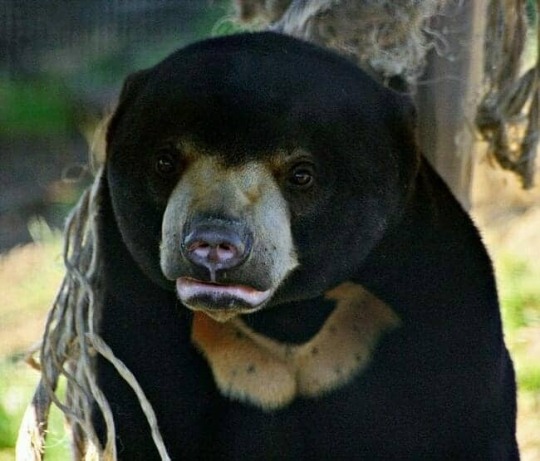
5 notes
·
View notes
Text
The scene in the Barbie trailer when Barbie is skating around with Ken and asks "Why is everyone staring at me?"
THAT'S EXACTLY WHAT IT FEELS LIKE TO BE AN ADOLESCENT GIRL.
Living in Barbieland (childhood girlhood) but then suddenly you're all grown up in the real world subject to scrutiny and sexualisation (the guy slapping Barbie's ass) and feeling like existing is a crime?
Being forced by adult men into a box (which leads to the not like other girls syndrome) and exploring the 'real world' (being forced to grow up too quickly) while fighting the realisation that maybe the world sucks and being a woman is so difficult while hoping with all your heart that it's not always going to be this way.
Losing touch with the very things that made you happy because they're considered immature and girly? (The group of teens that said they hadn't played with Barbies since they were five.)
Older women telling you that you have to learn the truth about the world and that you can never have your old life back (Kate Mckinnon's Barbie) despite it being the only thing you yearn for, but also older women being a bright spot and support (the old woman on the bench) in the endless slough of life.
And this is just the trailer!!! I'm so excited for this movie I can't breathe, Greta Gerwig the woman that you are 😭
#barbie#more thoughts on this when my mental coherence returns#but ahhh!#im also really excited to see america ferrera's role because I have a feeling it's gonna be pivotal#Barbie meta#the barbie movie#barbie (2023)#shut up im so excited#ken is the emotional support pet every adolescent girl needs#THIS IS EXACTLY WHAT IT'S LIKE TO BE A TEENAGE GIRL#i already love this movie so much#and it hasnt even released#thoughts r scattered cuz the trailer is that good
17K notes
·
View notes
Text
that ivan loves till is the most obvious thing about them
but. does ivan know that…?
the ivan that regards his own feelings as shallow, the ivan that learned how emotions are expressed only from copying others… does he even know that the love he’s felt for so long is love?
probably not. and part of the reason is the one he loves himself
because the easiest example he has of love is till's feelings to mizi. till outright calls it love, and ivan watches him so much he has to be aware of this
and till’s love to mizi is totally unselfish, right. he doesn’t seem to actually want much from her—just that she's still there and still "mizi"
but ivan can't be satisfied with just watching
he… wants. ivan wants till’s attention, till’s affection—
surely this selfish wanting can’t be love
...no wonder he was never able to express his feelings straightforwardly when he belittles them so much
but he can’t stand not having anything either, so he does… whatever he does instead to get any scraps of attention he can, from someone he's convinced doesn't care about him at all
only showing affection when till can't see it, right until he knows he's going to die
but ivan's feelings for till are all he still has of himself... to think of them as shallow...

I've seen this translated as "I should've been kinder" to him (till) or to her (sua)
but really, the one he should've been kinder to was himself
#alien stage#alnst#alnst ivan#ivantill#i have a lot of thoughts on till -> mizi too but this is long enough#just attempting to rewrite my twt rambles more coherently#idk why i wrote this so dramatically tho...#'thank you for being the victim of my shallow emotions' is going to haunt me to my grave#ivan's character is just a careful balance between his natural freak nature and his extreme depths of self-loathing#making him the most miserable guy ever#...really once you realize so much of what went wrong is thanks to ivan just hating himself too much to even think of them as friends. well#c...can we bring him back... don't die like this.....#(also you know. with the implications of how 'pets' are treated#wanting someone physically must feel... even more wrong
571 notes
·
View notes
Text
gintama said you have to live even if life sucks and it's embarrassing even if you only live for the small things even if you live day by day still you have to live. and it said when you live you pick up the burden that is caring about other people and you have to carry it always even if it's heavy even if you feel like you can't anymore even if you don't even realize you're carrying it until you drop it and you never ever want to pick it up again because what if you drop it this time too how can you do it all again but you do you always do. and it said when you care about someone else they care about you too. when you protect something it protects you back. how can this burden be so heavy when you're all carrying it together
#but also it said what if you woke up one day with a screwdriver dick would that be fucked up or what#in other words I've read it at the perfect time in my life and i will forever be normal about this i prommy#gintama#ah-ha i knew i said all of that already i have like three thoughts total#anyway @ali i was trying to say this but even less coherently#(this was in my drafts btw. in case that wasn't clear)
1K notes
·
View notes
Photo

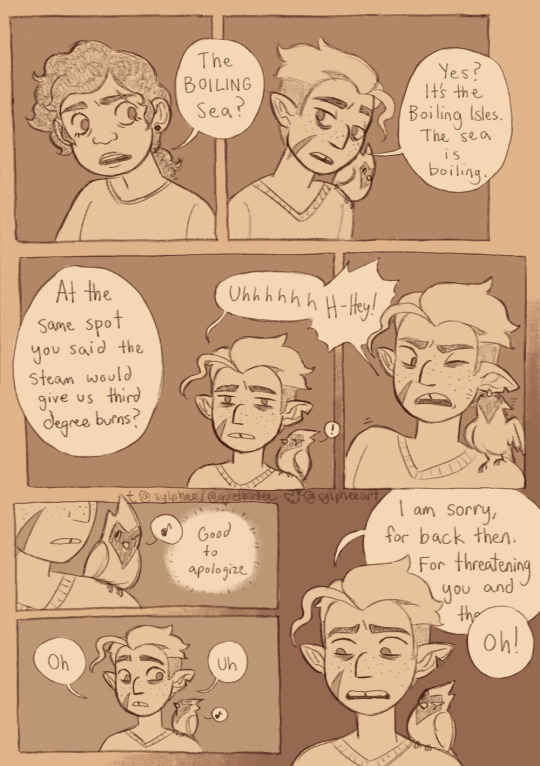
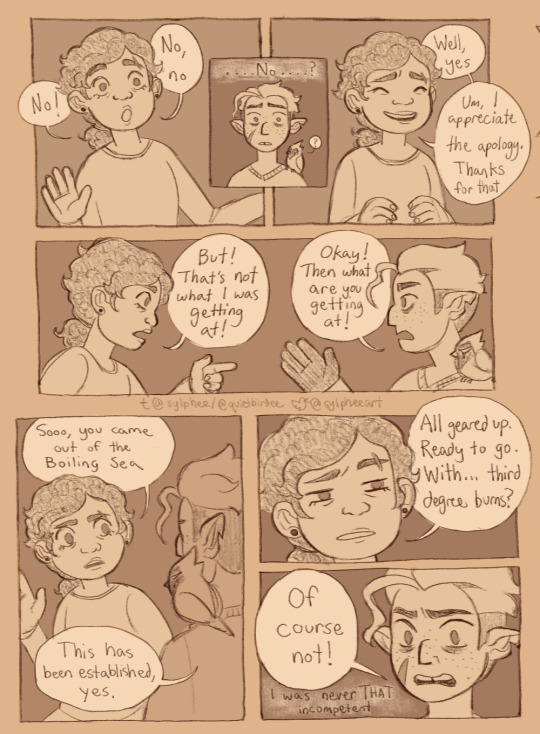
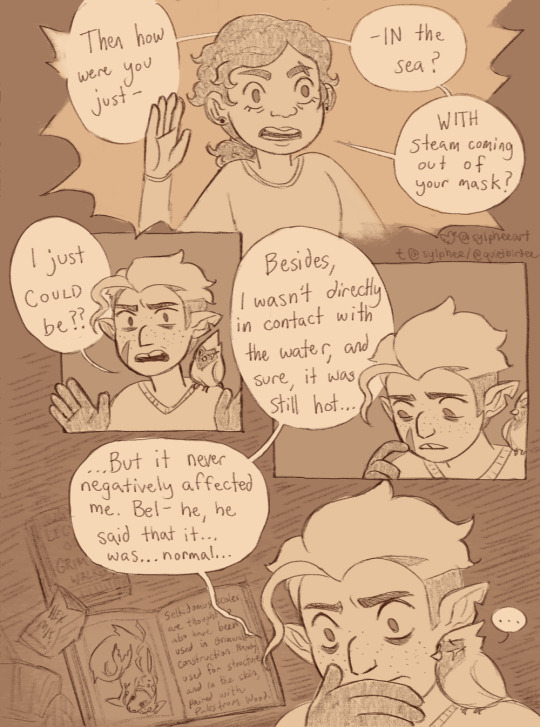
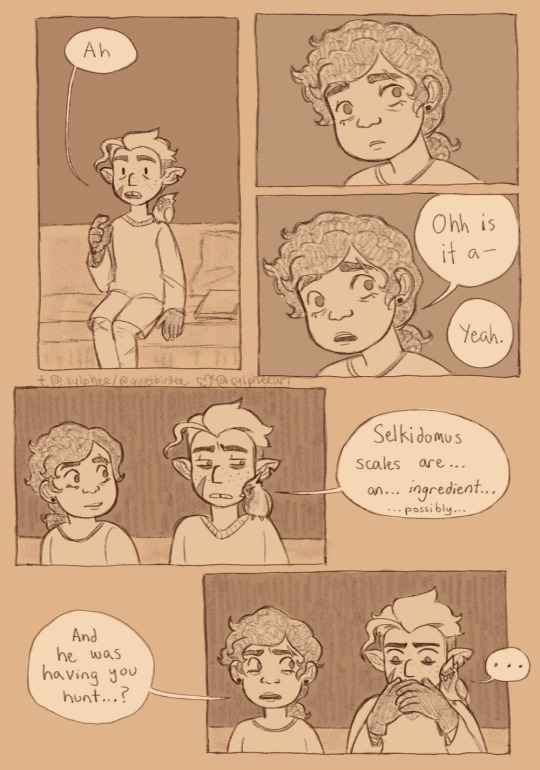

thinking about grimwalker-y things again, this time in regards to selkidomus scales and boiling water
bonus:
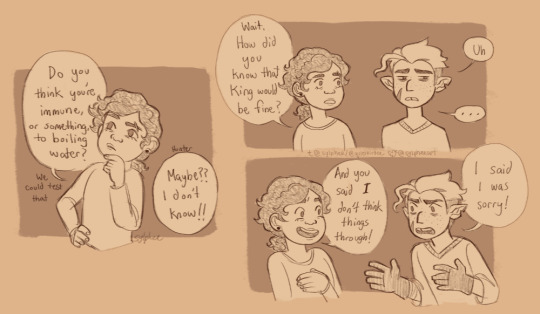
#i have a bunch of grimwalker construction thoughts#the owl house#toh#luz noceda#hunter toh#flapjack toh#sylphee art#selkidomus scales also have plant bits on top of them#so i was thinking that that's what ends up being a base for muscles and ligaments#since all the other ingredients are rocks scales wood and bone#i have a bunch of thoughts!!#i've been trying to piece it together coherently haha#also a bad belos bingo card is 25x25 squares with no free space#and every square is filled#toh spoilers#technically in regards to grimwalkers even if i don't actually name them in the comic
10K notes
·
View notes
Text
okay I've finished making my big spreadsheet of how mp100 characters refer to each other! some thoughts on this under the cut because it got long
the Kageyama brothers are very polite in how they refer to people. their parents must have really instilled etiquette into them bc no one else is as consistent about using polite honorifics/titles as they are. the only people Mob doesn't give an honorific/title are his brother and Dimple, and the only people Ritsu doesn't give an honorific are Dimple and Shou, who he just calls "Suzuki"
Reigen, on the other hand, is pretty inconsistent and casual with his use of honorifics. he says "Mob-kun" a couple times and "Ritsu-kun" once, but usually they're just Mob and Ritsu (or "Mob's brother" lmao). the only honorific he consistently uses is "Tome-chan"
it's infrequent, but both Reigen and Dimple refer to Mob as "my boy" at some point :') he's their boy!
Ritsu doesn't refer to the Awakening Lab kids at all until he asks their names after being kidnapped lmao the only exception is when he calls out to the older Shiratori brother after the younger one is taken away and he calls him "Shiratori-kun." considering the fact that after asking their names, he refers to both of them as Daichi-kun and Kaito-kun, I think there was absolutely a moment when everyone was freaking out about the Shiratori brothers where he was like "ohhhhh that's his name"
also he switches from "Onigawara-san" to "Onigawara-senpai" when he realizes he's friends with his brother lmao fakeass
even though Mob starts calling Teru "Hanazawa-kun" as soon as they exchange names, Teru doesn't give him the honorific until they decide to raid Claw together. I guess that's the point when he decides they're friendly enough for it? he calls Ritsu "brother-kun" as soon as he realizes they're related and never refers to him by his actual name
everyone calls Teru some variation on his nickname EXCEPT Mob and Dimple. Dimple actually only calls him "brat" and "that guy" for a while until he managed to track him down again during the alleyway incident, which I realized is because he was exorcised before learning Teru's name lskdjflkdsf from the Seventh Division arc onwards, he just calls him "Hanazawa"
I love that Dimple tries to refer to the brothers with cutesy nicknames and both of them are like "if you do that again I'm killing you all the way dead" and he's like "understood." and then refers to them by given name from then on lmao
Teru refers to Dimple as "Dimple-kun" and Tome calls him "Dimple-chan," both of which are SO funny to me because he's way older than them. rude as hell, this evil spirit deserves no respect
Shou doesn't use honorifics or titles for ANYONE. Ritsu is just Ritsu, the Ultimate 5 are all their last names, his dad is just Pops. he also exclusively refers to Mob as "Ritsu's brother" dkfjldskfj
Serizawa alternates between "Shigeo-kun" and "Kageyama-kun" with no real rhyme or reason to it. just seems to depend on his mood I guess
#mp100#this was fun I liked making it!!#the kageyama boys are so polite#I have some Thoughts about shou being the only one ritsu doesn't give an honorific#I wonder if I can wrangle those thoughts into a coherent post#teru definitely knows ritsu's name so I think calling him brother-kun is just an affectionate thing#or he can't call them BOTH kageyama(-kun) and he doesn't want to call him by his given name#ritsu always calls him teru-san which I think is sweet bc he's the only person ritsu refers to by a nickname#everyone else is always last name#shou on the other hand. I don't think he knew mob's name for most of the manga sdlkjfkldsjf#I don't think he learns mob's name until the confession arc and even then he still calls him ritsu's brother#which is hilarious to me#mob never refers to him by name but I think it's a safe bet that he'd call him suzuki-kun#based on how mob refers to most other people his age/younger#uhhhhh what else#dimple fucking HATES that tome calls him dimple-chan#he complains about it repeatedly in the reigen spinoff sldkjfkldsjf
2K notes
·
View notes
Text
Something about The Lost Boys, a deeply, deliberately queer movie all about vampires (so necessarily obsessed with blood transfer/exchange), where being attracted to the wrong person, taking risks around them, taking their tainted blood into your body, will change your life irrevocably and doom you to death, coming out in 1987, and saying that the real source of the majority of the problems caused by sharing tainted blood is a respectable middle-aged middle-class white man obsessed with power, heteronormativity, and the replication and eternal enshrinement of the nuclear family structure, and that the only way to survive and cure the infection is to destroy him...whoooo.
#'mary it's not that deep' wanna bet. wanna. fucking. bet.#i was reflecting on being a gay man and choosing to take on a project about vampires and deciding they should be old enough to fuck#and also it should be sexy and full of homoerotic tension#in 1987#and about a Take i had to see about how the ending seemed to reaffirm heteronormativity#and well. well.#also. like there's nothing in the movie that says the boys didn't genuinely like max or consider him a father figure#(there's basically nothing in the movie about what they thought of him. at all.)#but we ALL seem to have decided that even if they don't hate him they at least resent his attempts to assert authority#and. well. that has to come from somewhere. right?#ANYWAY. this is not a coherent thought. yet. somebody who's a film studies major get on this#the lost boys
212 notes
·
View notes
Text
The Sunshine Court spoilers
I feel like I haven't seen anyone really talk about this specific scene yet but something about it really gets to me like imagine going through hell and back to be the best only to hear that these other guys are enjoying themselves and have, y'know, basic things like autonomy and somehow managed to be nearly as good. Jean starting to realize maybe everything the Ravens did was for nothing and genuinely wanting to know why he had go through all that but the Trojans didn't and is it unfair? did he just waste 3 years of his life? If everything was rewritten could love have coexisted with being the best?


#im not wording this well bc my brain goes static when i try to form coherent thoughts about this book#but this scene !!#i feel like the foxes beating the ravens was a tough pill to swallow but theyre foxes for a reason#their lives are shit too and they have mafia kids already on their lineup#but the Trojans? mr. sunshine and his team? what horrors have they endured that could even compare? thats why itd be so much more jarring#tsc spoilers#the sunshine court spoilers#aftg#tsc#the sunshine court
178 notes
·
View notes
Text
Q's Relevance and Parallels to Double Black
I had a sudden brainwave of thoughts (read: I only got three hours of sleep last night) and needed to share. I've thought this for awhile but I really think Q will be returning to the series at some point.
First of all, there's just too much ambiguity there and I want to know more about Q in general. What happened to Q to spawn an ability like that? Why does Dazai speak about them like they're the devil incarnate? What was the incident that led to so many Mafia deaths in an effort to lock Q up? Is there any significance to Q's unusual eyes (remember that most characters tend to have fairly normal eyes, and this is a series where the eyes carry symbolic weight)? What's with Q being strung up in this position that is eerily similar to a crucifixion, shortly before Steinbeck has a conversation about God existing but not loving them?

There's a lot there. I've spoken about this before in the meta I did about Dazai's change in approach after the Q chapter, which was genuinely an unexpected event he did not anticipate. But there's something fascinating about the way Chuuya reacts to Q as well. In fact, both Dazai and Chuuya are almost uncharacteristically murderous towards this kid, and that's real interesting, seeing as many aspects of Q mirror aspects of their younger selves.
Now I understand you might be thinking: uncharacteristically murderous? Story, they have both literally killed many, many people before. Yes, but context is important here.
Dazai doesn't have strong violent urges - not even in the Mafia, where he was considered terrifying more so due to his apathy in killing than anything. I can't remember a scene where Dazai is described as radiating bloodlust like Kyouka or Mori. Dazai is scary because of his indifferent hollowness at his worst points. Odasaku was described similarly in Untold Origins - there was no real desire to kill, just a listless cold follow-through. Dazai's sadistic methods, brought up by Higuchi in Chapter 25, are acknowledged as a means to an end, a method, not something done out of any strong desire or enjoyment. So when Dazai makes death threats or appears visibly angered - that's something worth taking note of. For him to make a promise to Q to pluck out their heart - holy shit. That is not typical Dazai behaviour. He doesn't even make that kind of threat towards Fyodor. Whatever happened in the past clearly shook him, enough for this moment to change his approach in the series and send him back to using darker methods again.

As for Chuuya, while he has and does kill quite readily, this is mostly in the heat of a fight. For him to give the go-ahead for murdering an unconscious child - it's unusually cold-blooded for him, and I can't think of another instance where he's down with lethal intent outside of combat and direct orders. I've seen some people talk about his reaction to Dazai suggesting he'll kill Q as proof that he's gotten darker since we saw him last in Stormbringer, from someone who would plead for the lives of the Sheep to be spared ("They're just kids") to being ready and willing to kill a defenseless child. While I think it's likely true that he's gone darker since that point - Chuuya appears to be more cynical in the present as well as having darker eyes with a smaller central pinprick of light than in Fifteen and Stormbringer - that's not the only thing going on here.
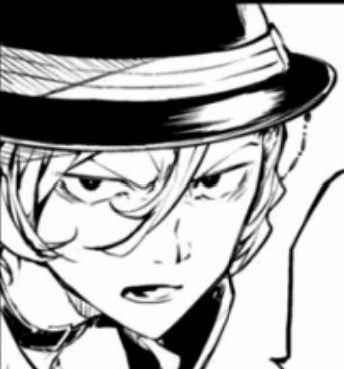
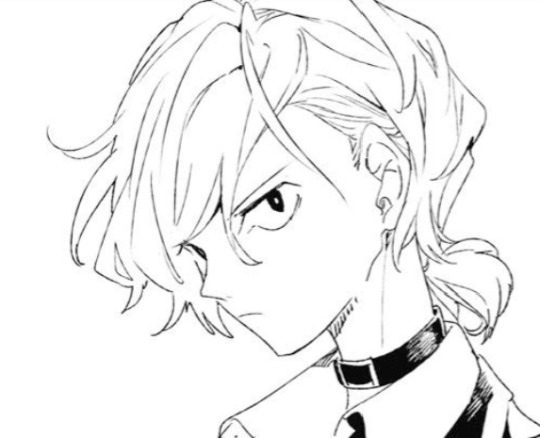
Thing is, Chuuya has always been fairly ruthless. He’s a very vengeance oriented character, right down to his fighting style (rebounding attacks and bullets). Hurt him or someone he cares about and he hurts back - and that threat will be destroyed. Parallel to this is how he is seemingly unable to turn his back on people who have helped him. Help him and he will remain loyal and protective even if that person goes on to stab him in the back. He has a very “give and take” mentality. Chuuya operates on the reciprocity principle.
So, about Q, here’s the thing: Q is a part of the Mafia, that's true. But Q has never helped them, only hurt indiscriminately. Mafia philosophy says “protect your own and follow the boss' wishes no matter what”. But Chuuya’s philosophy is saying “neutralize the threat”. And interestingly, Chuuya’s philosophy won here. If Dazai had've killed Q, Chuuya would’ve defied Mori’s orders in favour of his own judgement, which is extra intriguing because it emphasizes Chuuya’s loyalty to the people within the Mafia, not the Mafia as an organization itself. This is in full contrast to people like Tachihara and Hirotsu, who prioritize the organization and orders above all.
And about Q being a child: I don’t think this is such a big change in his character if I'm being honest. Chuuya knows full well how dangerous a child can be - he was that dangerous child. People underestimated him as a teenager and paid for it dearly; do you really think he'd make that same mistake? He also has a very warped view on the responsibilities and ways a child should be treated… while I do believe he probably is protective of those younger than him, he also equally understands that a child can be just as much of a threat as anyone else. For Chuuya, it’s always a matter of what wins out: the person or the threat? In this case, it was the latter.
The thing is, it's interesting the way they react when you look at the way Q eerily parallels aspects of their younger selves - as well as some things that carry over to the present.
Dazai and Q share central themes of control.
Q's mind control ability is actually referenced by Dazai as being essentially the worst kind of ability there is, and I know I've mentioned before how he seems to react poorly to those people who attempt to mentally control others, placing them on a heightened level of danger (think Fyodor, Mori). I don't think I need to get into Dazai's control freak tendencies - and what's more, after Q's introduction, after he says that mind control is the worst kind of ability there is - he ramps up his masterminding and enacts as much control as he can over the proceedings of the events that follow. Q's ability is interesting in the sense that it allows them control over others, implying Q came from a background of little control. I have also hypothesized that Dazai, with his need for situational control, similarly came from a background of little control. It's also likely they both were hurt by others - Q's ability turns any pain inflicted on them back around, giving them a way to fight back, while Dazai can level the playing field of any unfair advantages by nullifying abilities.
Q's small segment in Fifteen is also interesting: they're near completely zoned out, just staring off into the distance without responding to their environment until Dazai gets directly in their face. Then Q suddenly flips a switch and becomes all cheerful and playful. It reminds me of young Dazai's quick switches between faux cheerfulness and emptiness earlier in that same book.
They also both have quite interesting relations to pain. Q wonders why cruel things always hurt them, but Q makes this a foregone conclusion by purposely arranging others to hurt them so they have an excuse to hurt those people back. Q's pain becomes a self-fulfilling prophecy: they hate it, but the only means of control they know in interactions with others requires it. Dazai similarly hates pain - his pain loop, however, is more emotional than physical. Dazai feels isolated and alienated from others, but his attempts to exert control require him to distance himself and rely on his mind over all else. He also leans into his inhuman side when it becomes apparent pain is unavoidable (I think often of his reactions throughout Dark Era to Ango's betrayal) - again, this becomes a self-fulfilling prophecy. He will not find anything. He will continue to be separate from humanity if this cycle continues. That was why it was imperative that Odasaku break him out of it. Self-sabotage behaviours and unhealthy cycles, physical and emotional, are apparent with these two.
For bonus points: both have injured right arms.
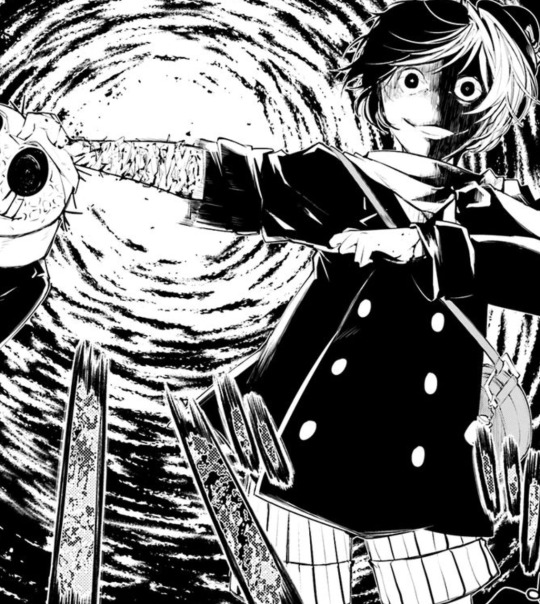

On a more superficial level too, Q and Dazai both have "creepy child" energy, with emphasis on the child part - they are both legitimately disturbing at times but also have moments where they show childlike interest and behaviour. (I encourage people to check out Q's mayoi cards for this - I know it's not super canon or anything but it emphasizes their "kiddishness".)
Also I'm unsure if this is significant, but there's this detail too:


Q has a very unusual right eye with a star in the center. The right eye is also the one Dazai kept covered in the Mafia. Notably also, Q's right eye is frequently obscured by their hair in key scenes.

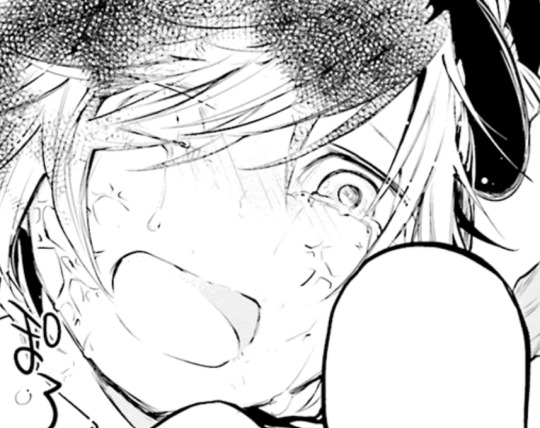
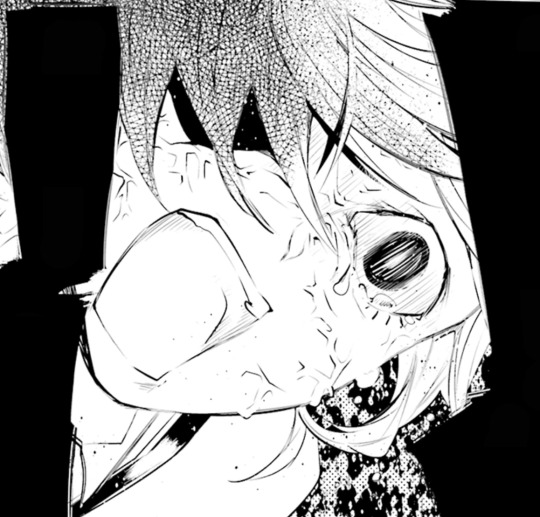
...Does it mean something? I have no idea. But it's potentially interesting so I thought I'd add it.
Meanwhile, Chuuya and Q share themes of loss of control.
For Q, this is quite obvious. They are literally locked up; imprisoned within the Mafia and unable to exert control over their circumstances. For Chuuya, it's a little more subtle but still present, I believe: I invite people to look at his character song and mayoi (particularly aquarium) for direct references to feelings of being trapped. However, looking at Fifteen and Stormbringer, there are a few mentions of freedom that are intriguing in relation to Chuuya's character. In Fifteen, both Dazai and Shirase mention Chuuya's "freedom"... but this is almost a mockery of what's really going on. A party to celebrate Chuuya's freedom is really an elaborate set up for a trap. Shirase telling Chuuya that he should have the freedom to act on his own wishes is really a cover up for a betrayal. In both instances, Chuuya's freedom is a lie. Stormbringer, at the very least, instates a sense of agency where he at least has the freedom to make choices about his own actions - that's the whole point of his hat; it's a symbol of autonomy (also anti-mind control; more on that in a bit). However, Stormbringer also systematically strips away the start of any alternate path Chuuya could've taken - he cannot be the child he was, he never got to hear the pitch on living in the light. He feels genuine gratitude towards those in the Mafia - they have his back, which is more than he could say before, but at the same time, the Mafia is kind of the last option available there if he wants not to be alone... and Chuuya does not want to be alone. (Seriously. His character song. Please look at it. Also Stormbringer.)
Now, onto their abilities, which also parallel in the sense that they are both used to "get back" at people. Chuuya rebounds attacks - bullets shot at him ricochet back at the people who fired, and Q hurts people who hurt them. There's a very reciprocal relation to the way they use their abilities, and it is absolutely to induce fear and intimidation in others, but there's a key difference. Namely, Chuuya fights only against enemies or people who strike first. Q, on the other hand, intentionally makes "enemies" out of even innocent bystanders just to have a reason to hurt them back. A lot of this is due to Q's misanthropic nature - I doubt Q has ever had a positive bond with another person, and so Q sees the whole world as their enemy - a world which, to them, does not want them in it. Chuuya, on the other hand, has had people who care about him, and he cares about them in turn. He's a bit jaded but he doesn't hate humanity, far from it.
In that sense, Q parallels Verlaine in a sense, right down to being kept in a special secret room in the Mafia, hehe. Though again, there's differences. Verlaine chooses to stay in that room, first of all, while Q doesn't have a choice. Verlaine's angst is internal identity based while Q's is more external situation based. In response to their pain, Verlaine chooses to relinquish control of himself (Brutalization), and Q chooses to have everyone else lose control of themselves (Dogra Magra). Verlaine says "look at how monstrous I am and how I hate and hurt because of it" and Q says "look at how monstrous you all are and how I hate and hurt because of it".
Chuuya is not so far on either extreme that he emulates this - but he could've ended up like Verlaine, and he admits it in Stormbringer. He could've maybe ended up something like Q too, if he'd remained trapped as a lab rat. But see here's the key with Chuuya: his hat makes it so the choice to lose control of himself is his alone, and moreover, that losing control doesn't mean he goes out of control. He trusts that he can lose control for a bit, place it in someone else's hands for awhile before it goes too far. Trusts that the choice to lose himself will be followed by the keeping of a promise to bring him back to himself. Chuuya has bonds, and that's the key difference.
But uh. Going back to parallels... about the scene where Q gets tortured... and the scene where Chuuya gets tortured...

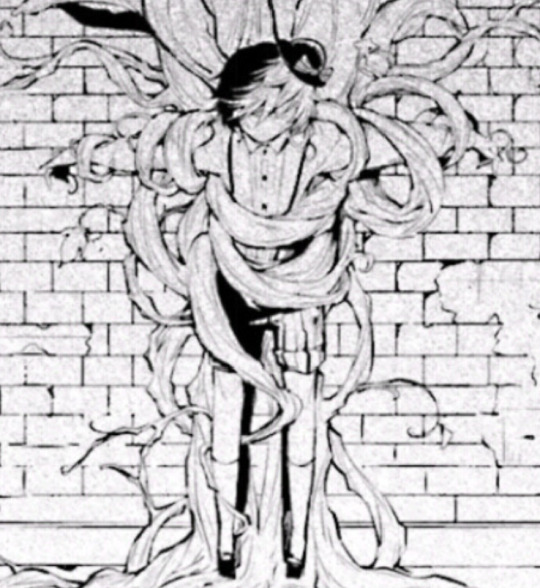
Is this significant...?
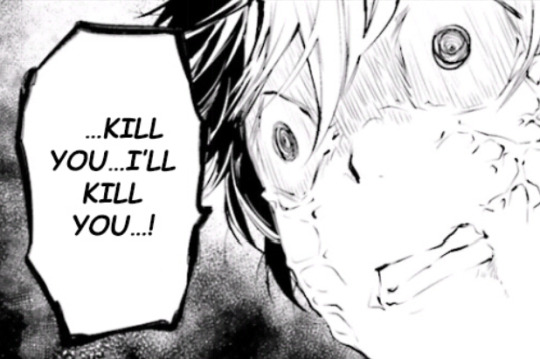

...is... is this...

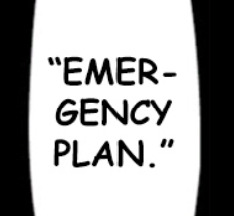

...


.............
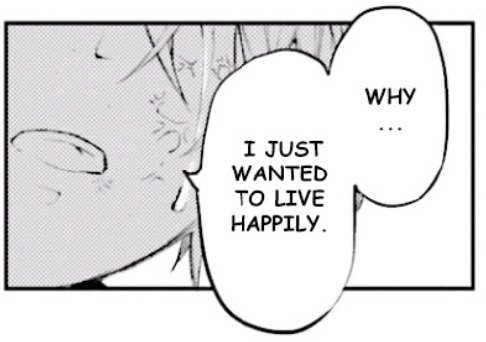




Um. I may be delusional. But. Well. *gestures at all of this*
So, where does this leave us? Well, we have Dazai, who sees a manipulative, mind-controlling kid that he calls a "walking disaster", and we have Chuuya, who sees a dangerous ability user that is too big of a potential threat to not be dealt with, so the two decide the best course of action is to kill them about it. The reason Dazai did not follow through is likely a mix of his stated reason (the Mafia cannot harm Dazai so long as he is needed to stop Q), and probably also that he isn't really supposed to be directly killing anymore.
Nice, guys. Really clear and consciously held self-concepts you got there.
Considering everything, it's maddening that all we have on the dynamic between these three is: Q joins in Fifteen at the same time as the other two and is assigned to Dazai since he can stop their ability. Mori doesn't know what it is at that point but assumes whatever it is will be manageable because Dazai can just nullify it. It... clearly wasn't.
I feel like there has to be something here and that we're going to be coming back to it. Q, the old Boss, how Mori got so close as an underground physician in such a short time... there's so much about the Mafia we don't know so I'm assuming the story will shift to focus on these points again... someday. Hopefully.
#i have even more thoughts unwritten if you can believe it but seeing as it is 4 am i should probably stop. also this is too long.#but yeah i frequently think about how horrified and genuinely spiteful dazai is with q like... what happened???#ok just had an awful thought: what if whatever happened with q inspired dazai's brutal treatment of akutagawa#...honestly maybe. it's actually a possibility if something went terribly wrong before.#this... isn't the meta i was supposed to be writing or even started to write... oh well#enjoy?#is this even coherent?#bsd#bsd meta#bsd q#bsd dazai#bsd chuuya#soukoku#skk#bsd fifteen#bsd stormbringer#storyrambles
900 notes
·
View notes
Text
people will be like ‘yeah it’s really relevant that utena is an orphan haha’ and then not even recognise how utena being a character without living blood relatives is hugely significant in a show where almost all of the most atrocious relationships are ones that have been spurred on by the notion of familial/blood obligation. and utena herself clings so tightly to what is essentially a romantic ideal of ‘the family’, ‘the blood relative’, telling anthy she’s jealous of her relationship with akio, insisting to nanami that she should persevere with her relationship with touga because you’re still siblings. in ohtori, family is something you can only be born into. in ohtori, family is the way you gain power. i mean for the love of god it’s right there, revolutionary girl utena is a family abolitionist masterpiece and it makes me claw at the walls!!!!!!!!! read the palace perspective!!!!!!!!!!!!!!!!!!! engage more with these aspects of the show!!!!!!!!!!!!!!!!!!!!!!!! kill any and all people who go ‘why are there so many weird sibling dynamics i only came for the lesbians’ her NAME is kiryuu nanami and she does both!!!!!!!!!!!!!!!!!!!
#is this even coherent im feeling deranged#i love you rgu i LOVE what you said about family it was so crazy fr fr#it’s just like. gestures wildly at the entire show. and i was like aaaaaaaaaa#who wants to hear all my thoughts about the kiryuu siblings and utena and anthy and akio hanahahahahahaha#and monarchies and sacrifice and obligation and guilt and resentment etc etc etc#the we should live to help each other of it all. throwing up and screaming#why should you live to help each other? because you’re siblings????? like. like. utena says ‘because i love you. because i love you’#and she actually does. and that’s not a manufactured love she’s been told she should feel#it’s in fact the opposite bc it’s queer#‘everyone loves their siblings because you’re siblings and that’s how it works tee hee’ vs queer love as a destructive force#god anyway im normal (lie)#rgu#revolutionary girl utena#shut up daisy
2K notes
·
View notes
Text
Hello!! I'm back for: more whining about TotK Quest Design Philosophy
I can't reblog a really great post I just saw for some reason (tumblrrrr *shakes my fist*), but hmmmm yeah not only do I completely agree, but I think I might expand on why I feel so much annoyance towards TotK's quest design philosophy at some point, because it does extend past the fundamentally broken setup of trying to punch a pseudo-mystery game on top of BotW's bones, where the core objective was always explicit and centered and stapled the entire world together; or the convoluted and inefficient way it tells its story through the Tears, the somehow single linear exploration-driven quest in the entire game.
Basically: I'm talking about the pointless back-and-forths. There were a lot of them, a lot that acted against the open world philosophy, and almost none of them ever recontextualized the environment through neither gameplay abilities nor worldbuilding nor character work.
I'll take two examples: the initial run to Hyrule Castle (before you get your paraglider), and then the billion back-and-forths in the Zora questline.
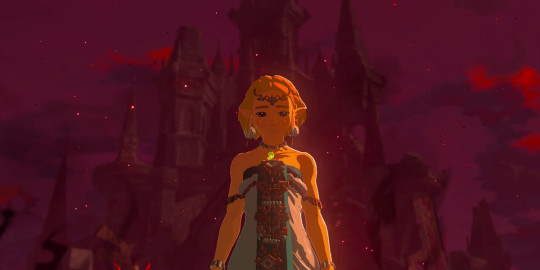
I think?? the goal of that initial quest to Hyrule Castle is to familiarize you with the landmark, introduce the notion that weapons rot, tell you about the gloom pits, and also tell you that Zelda sightings are a thing? But to force any of these ideas on you before giving you a paraglider is, in my opinion, pretty unnecessary. I think the reason it happens in that order is to prevent Link from simply pummeling down to the gloom pit under Hyrule Castle and fight Ganondorf immediately while still introducing ideas surrounding the location; but genuinely, the Zelda sighting makes the next events even more confusing? Why wouldn't you focus all your priorities in reaching the castle if you just saw her there? Why lose time investigating anything else? Genuinely: what is stopping you from getting your paraglider and immediately getting yourself back there, plunging into the depths to try and get to the literal bottom of this? (beyond player literacy assuming this is where the final boss would be, and so not to immediately spoil yourself --which, in an open world game, you should never be able to spoil yourself by engaging with the mechanics normally, and if you can that's a genuine failure of design)
I think, personally, that you should not have been pointed to go there at all. That anything it brings to the table, you could have learned more organically by investigating yourself, or by exploring in that direction on your own accord --or, maybe you think Zelda is up there in the castle, and then the region objectives become explicitely about helping you reaching that castle (maybe by building up troops to help you in a big assault, or through the Sages granting you abilities to move past level-design oriented hurdles in your way, etc). Either way: no need to actually make you walk the distance and back, because the tediousness doesn't teach you anything you haven't already learned about traversal in the (extremely long, btw, needlessly so I would say) tutorial area.
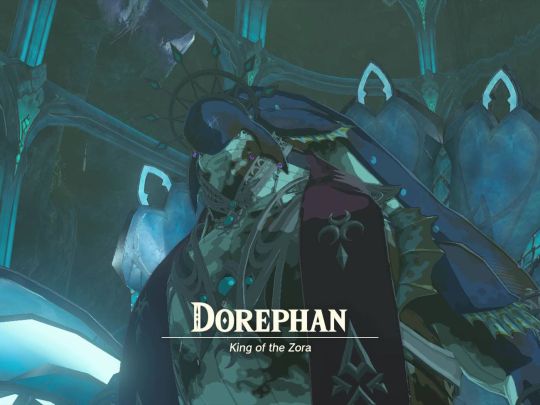
But to take another example, I'll nitpick at a very specific moment in the Zora Questline, that is honestly full of these back-and-forth paddings that recontextualize absolutely nothing and teach you nothing you didn't already know. The most egregious example, in my opinion, is the moment where you are trying to find the king, and you have to learn by listening in to the zora children who do not let you listening in.
So okay. I think Zelda is great when it does whimsy, and children doing children things guiding you is a staple of the series, and a great one at that. But here? It does not work for me on any level. Any tension that could arise from the situation flattens because nobody seems to care enough about their king disappearing in the middle of a major ecological crisis, except for children who are conveniently dumb enough not to graps the severity of the situation, but not stressed out enough that it could be construed as a way for them to cope about it and make anything feel more serious or pressing. It feels like a completely arbitrary blocker that isn't informed by the state of the world, doesn't do anything interesting gameplay-wise with this idea, doesn't build up the mood, and genuinely feels like busywork for its own sake.
This is especially tragic when the inherent concept of "the zora king has been wounded by what most zoras would believe to be Zelda and is hiding from his own people so the two factions do not go to war over it" has such tension and interest and spark that the game absolutely refuse to explore --instead having you collect carved stones who do not tell you anything new, splatter water in a floating island, thrud through mud who feel more like an inconvenience than a threat or, hey, listen to children playing about their missing king less than a couple of years after being freed from Calamity Ganon's menace. It feels like level designers/system designers having vague technical systems that are hard-coded in the game now, and we need to put them to use even if it's not that interesting, not that fun or not that compelling. It's the sort of attitude that a lot of western RPGs get eviscerated for; but here, for some reason, it's just a case of "gameplay before story", instead of, quite simply, a case of poorly thought-out gameplay.
Not every quest in the game is like this! I think the tone worked much better in the sidequests overall, that are self-contained and disconnected from the extremely messy main storyline, and so can tell a compelling little tale from start to finish without the budget to make you waddle in a puddle of nothing for hours at a time. It's the only place where you actually get character arcs that are allowed to feel anything that isn't a variation on "very determined" or "curious about the zonai/ruins", and where you get to feel life as it tries to blossom back into a new tomorrow for Hyrule.
But if I'm this harsh about the main storyline, it really is because I find it hard to accept that we do not criticize a structure that is at times so half-assed that you can almost taste employees' burnout seeping through the cracks --the lack of thematic ambition and self-reflection and ingeniosity outside of system design and, arguably at times, level design-- simply because it's Hyrule and we're happy to be there.
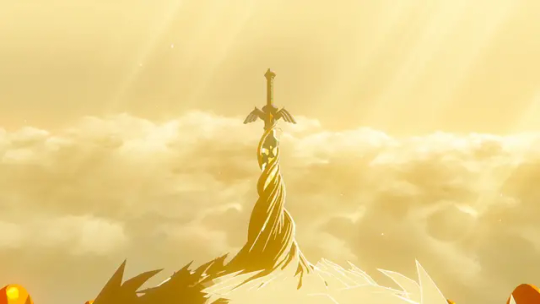
There's something in the industry that is called the "wow effect", which is their way to say "cool" without saying "cool". It's basically the money shots, but for games: it's what makes you go "ohhhh" when you play. And it's great! The ascension to the top of the Ark was one of them --breathtaking, just an absolute high point of systems working together to weave an epic tale. You plummeting from the skies to the absolute depths of hell is another one; most of the dungeons rely on that factor to keep your attention; the entire Zelda is a dragon storyline is nothing but "wow effect" (and yeah, the moment where you do remove the Master Sword did give me shivers, I'll admit to this willingly) and so is Ganondorf's presence and presentation in the game --he's here to be cool, non-specifically mean, hateable in a non-threatening way and to give us a good sexy time, do not think about it too hard. What bothers me is that TotK's world has basically nothing to offer but "wow effect"; that if you bother to dig at anything it presents you for more than a second, everything crumbles into incoherence --not only in story, but in mood, in themes, in identity. This is a wonderfully fun game with absolutely nothing to say, relying on the cultural osmosis and aura of excellency surrounding Zelda to pass itself off as meatier than it really is. This is what I say when I criticize it as self-referential to a fault; half of the story makes no sense if this is your first Zelda game, and what little of that world there is tends to be deeply unconcerned and uncurious about itself.
And no, Breath of the Wild wasn't like this. Breath of the Wild was deeply curious about itself; the entire game was built off curiosity and discovery, experimentation and challenge (and I say this while fully admitting I had more fun with the loop of TotK, which I found more forgiving overall). The traversal in Tears of the Kingdom is centered around: how do I skip those large expanses of land in the most efficient and fun way possible. How do I automate these fights. How do I find resources to automate both traversal and fights better. It's a game that asks questions (who are the zonais, who is Rauru and what is his deal, what is the Imprisoning War about, where is Zelda), and then kind of doesn't really care about the answers (yeah the zonais are like... guys, they did a cool kingdom, Rauru used to run it, the Imprisoning War is literally whatever all you have to care about is who to feel sad for and who to kill about it and you don't get a choice and certainly cannot feel any ambiguous feelings about any of that, and Zelda is a dragon but we will never expand on how it felt for her to make such a drastic and violent choice and also nobody cares that's a plot point you could *remove* from the game without changing the golden path at all).
I'm so aggravated by the argument "in Zelda, it's gameplay before story" because gameplay is story. That's the literal point of my work as a narrative designer: trying to breach the impossibly large gap between what the game designers want to do, and what the writers are thinking the game will be about (it's never the same game). And in TotK, the game systems are all about automation and fusion. It's about practicality and efficiency. It's also about disconnecting stuff from their original purpose as you optimize yourself out of danger, fear, or curiosity --except for the way you can become even more efficient. And sure, BotW was about this too; but you were rewarded because you had explored the world in the first place, experimented enough, put yourself in danger, went to find out the story of who you used to be and why you should care about Hyrule. I'm not here to argue BotW was a well-written game; I think it was pretty tropey at large to be honest, safe for a couple of moments of brilliance, but it had a coherent design vision that rewarded your curiosity while never getting in the way of the clarity of your objective. There is a convolutedness to TotK that, to me, reveals some extremely deep-seated issues with the direction the series is heading towards; one that, at its core, cares more about looking the part of a Zelda game than having any deeper conversation about what a Zelda game should be.
#thoughts#tloz#totk#totk critical#when will my brain return from the imprisoning war...#quest design#game design#level design#game criticisim#I think the more time goes on and the more uncomfortable I am with “if the game is fun it's good”#sometimes the game is fun and the game is empty#fun games can be addictive and predatory on purpose#(not saying totk is but it is well known that fun is not a neutral feeling)#fun can also reinforce questionable ideas of what “fun” should even look like#*side-eying CoD and co*#and fun =/= coherent always#if we're talking about games like artpieces#then you don't get to pick and choose which parts matter and which parts don't#you can absolutely say “I resonated with it for X and Y” but to make an argument that people who feel uncomfortable by content#that is in the game!! put in the game!! on purpose!!#is not a very productive attitude let's say
159 notes
·
View notes
Text
i cannot stop thinking about ian rider. more specifically, how alex had so many unprocessed feelings about him after his death. imagine being an orphan, getting adopted by your uncle as a baby, having him raise you for 14 years then discovering he lied to you your entire life. that he [unintentionally or not] trained you to be something you never wanted to be under the guise of bonding with you. never being able to ask him what his actual intentions were because he's dead. never getting closure for it. im going to throw up.
#i remember reading stormbreaker for the first time and i could not stop crying the entire book#i have big emotions dont blame me#but seeing alex follow in ian's footsteps quite literally seeing and living through what lead to his death#it fucked me up#i dont remember if it was outright stated in the books but alex wondering the entire time if ian even loved him?#it wasn't framed directly but thats how i interpreted it#i cant even coherently put into words all my thoughts about this#ontop of everything else this is one of the core things that makes me so emotional over this silly little book series like holy shit#alex my son i just want to give you a hug#alex rider#alex rider books#ian rider#please don't get me started about my thoughts of whether or not ian did in fact love him#my head might explode#these books fucked up my brain chemistry permanently
80 notes
·
View notes
Text
Ya know what’s curious to me? In Episode 2 when Crowley asks Aziraphale in the cellar whose side he’s on, Aziraphale responds “God’s, of course!”
Ya know why this is curious?
Well, for one, they’re talking about sides. Heaven and Hell. Their respective bosses. Crowley’s response of going along with Hell as far as he can makes sense, it’s what we expect to hear, but when he turns the question on Aziraphale, he doesn’t exclaim ‘heaven’s obviously!’ He immediately associates himself and his values with God directly.
Second of all, In episode 6, when talking about accepting the Metatron’s job offer as the new supreme archangel with Crowley, Aziraphale says “but heaven! Well, it’s the side of truth, of light, of good.”
For the entirety of Good Omens season 1, Aziraphale had always talked about following God’s ineffable plan, which was a noticeably different turn of phrase than those such as Gabriel used in heaven, always referring to it as the Great Plan. This is even the very thing that lead them to wiggling their way around Armageddon in the first place when confronted by Gabriel and Beelzebub.
Aziraphale has always made the distinction that he is an angel and does good because he believes that God is good and he trusts in their design.
Now I might just be loosing it, it is nearly 3am, but this sudden distinction and the choice of Aziraphale to not only discuss heaven in such a manner, but to refer to it as an entire Side, and use the adjectives he uses to describe heaven when we’ve only ever seen or heard him talk about God this way… it just all plays very intentional to me. It feel’s weird.
Especially once you take into consideration the flashbacks we’re shown of Beelzebub and Gabriel discussing the failed Armageddon in their little pub rendezvous. They never once mention their respect ‘boss’. Gabriel says “we are ready for round two.” And Beelzebub’s response is “as are we.” This we that they’re referring to isn’t God. It’s not Satan. They’re talking about the beings who reside in these respective places. The Angels and the Demons. And the conversation then continues with Gabriel admitting, “everyone in Heaven is all like, ‘Well, you’re the commander-in-chief, can’t you just make the war happen anyway?’ Like, I make the rules.” And whats Beelzebub’s response? “That’s exactly what my lot said.”
The pressure isn’t coming from God anymore. In the past, like seen in the Job episode, when there were divine tasks at hand they were dealt with by the angels for God, and God was directly involved in finding the outcome. There was no going through management or filing paperwork or monitoring miracles. And hey, I get it. As time evolves along with the humans, so does everything else.
My question is, is it possible that with these evolutions in the human world, that Heaven and Hell have perhaps learned a thing or two from humanity as well? Already they’ve mimicked the clothing, the office spaces, the entire design of heaven and hell down to the management hierarchy. Is it possible that these wars and these fights aren’t being started by God anymore, but an act of civil war amongst the Angels and Demons? We already see Michaels urge for power and control paralleled and almost foiled by Shax’s drive for control and power and both were the driving factors between any of the Major problems this season that lead to major conflicts between Heaven and Hell.
That brings us of course, to the Metatron. Who is he and where exactly did he come from? When did his position become necessary and why wasn’t he present as the ‘voice of god’ in the job minisode? Why suddenly are all of God’s plans, only being carried out by him?
Do you want to know why I think Gabriel was being demoted and not sent to Hell as a fallen angel? Because I don’t think they can. I think that’s something only God can do, but what kind of fear and control would that hold over all the busy bee’s? No, no, instead, let’s frame it as a Kindness. Heaven won’t cast you out because it will make them look bad! because it’s happened before, so they have no choice but to play a game of politics to keep everyone in check.
But here’s my question. Has there been a fallen angel since the great war? Why is it that after all this time, Aziraphale hasn’t fallen time and time again? Why is it that instead of an Angel falling from grace to join the armies of hell, the response to an act of rebellion is absolute destruction. The same could be said for hell. If you have demons walking around that are doing good, wouldn’t that simply just re-spark their halo’s? Why is it that they’d be destroyed by Holy Water instead of simply returning to Heaven?
It’s because God plays an ineffable game of their own design. They’re not playing with earth, or humanity. They’re toying with the Angels and the Demons. It’s why they’re placing bets with Satan.
When Crowley’s attempting to convince Aziraphale to run away for the last time, he doesn’t say Fuck God and Fuck whatever game this is, we don’t need to be a part of it. He says Heaven and Hell are toxic we need to get away from them.
It’s just so curious to me how this season has carefully and slowly taken us away from the idea of God and God’s Ineffable Plan and instead led us into this drama between Heaven and Hell, no mention of God whatsoever. No narrator.
#thoughts anyone?#genuinely curious if i just need a fucking nap#but also idk this time watching it really just struck me#when theyre discussing sides in the job minisode#they’re talking about heaven and hell#when the question is turned back on Aziraphale however#unlike crowleys answer of ‘i go along with hell as far as i can’ he doesnmt even mention Heaven#he goes straight to god#uk what thats a good point#let me add that into the post rq hold on#fuck me i went back to add the little paragraph and went on a tangent#it is now nearly 4am#so#ahem#shit#i hope this is even vaguely coherent and that people see it#i hope it doesn’t get swallowed by the void cause i think im onto something but im so tired#bi.f.shit#good omens#good omens 2#good omens 2 spoilers#crowley#aziraphale#ineffable divorcées#ineffable husbands#good omens spoilers#good omens meta#good omens analysis
260 notes
·
View notes
Text
Does anyone ever think that like. One of the central ideas of Hannibal is that human beings are delicious.
Not even just in a cannibalism-taboo way, either. Literally everyone who’s gone to one of Hannibal’s dinner parties agrees: The food is good.
(There’s that confusing moment in Trou Normand where it looks like Abigail is realizing what it is she’s eating--confusing because she doesn’t Figure Hannibal Out until later. But what if she isn’t thinking, This tastes just like-- but instead I haven’t had meat this good since--)
It’s not just the taste, either. Human beings in Hannibal seem to make incomparable mushroom fertilizer and instrument strings. Bees love human bodies. And every artist in the entire goddamn world seemingly has this temptation towards human-corpse-as-artistic-medium. Garret Jacob Hobbs uses human hair as pillow stuffing. He holds his pipes together with paste made from human bones.
Also probably worth mentioning is That One Shot in Sorbet (no, That Other One Shot in Sorbet)--the one with the opera singer’s throat, followed by the lingering shot of Hannibal’s ear. It’s the meat again. Meat is singing and more meat is listening. Hannibal is moved to tears--his enjoyment even of music is physical.
It’s probably stretching a bit to try to fit Self-Actualization Via Murder into this paradigm but well. I’m going to try anyway. It’s not just the corpses but the making of corpses that holds this fantastic power in Hannibal Land. We’ve got Randall Tier and Francis Dolarhyde and Will Goddamn Graham all reaching (for) their truest selves via the doing of murder. Hannibal talks about it like this:
We both know the unreality of taking a life. Of people who die when we have no other choice. We know in those moments they are not flesh, but light, and air, and color.
There’s something magical about that. The moment when a person separates from their (useful! valuable! delicious!) body and becomes something else. The moment itself is valuable, if you are one of the Tier-Dolarhyde-Graham classification of killers in Hannibal’s universe.
I feel like I’ve seen a lot of focus on Hannibal disguising what it is he’s cooking with. How his cooking is so good despite. If this post has a thesis, I guess it is that, instead, Hannibal is a good cook because.
#hannibal#meta#and#hannibal meta#is this how you meta i don't even know i don't do this but i got this thought stuck in my head#don't you need A Point#here's another attempt at A Point#so much of art is about what's left behind when you move bodies in space#or at least#i'm a big calligraphy nerd (and so is hannibal and) that's what calligraphy is all about#and i suppose Some Kind Of Artistic Idea Related To That Would Be#a body (alive) moves a body (dying) through space#(through multiple spaces as Body Singular becomes Pieces Plural)#and what's left behind after they both stop is It#ok ok ok ok the more i write the less coherent this becomes Send Post
488 notes
·
View notes
Text
As a continuation of this ask that I responded to, all the things I mentioned are just parts of the overall issue I have with Blades…. which is that, in the grand scheme of things, I feel like MC is simply a plot device for the other characters rather than a fully developed character who has a fully developed and satisfying arc herself. It’s clear that Nia’s is the story the writers really wanted to tell considering how intertwined her characterization/development and the overall world building are. They basically even admitted as much.
So my question is why not just make her the MC if that’s really what you wanted on the not so down low? They still could’ve incorporated the skill mechanic. Why create a whole player character just to have us running to solve everyone else’s problems/support them while acting like everything that happens to us exists inside of a vacuum in the meantime? So far, all we’ve really been doing in this book is reporting where the group needs to go, telling them what to do, having heart to hearts with them when they need help moving to the next stage of their development, and then being spoonfed information through the lore tablets, which are apparently more for the players’ benefit than MC’s since they barely affect how we respond in game anyway. I’m fine with being the leader or the glue that holds everyone together, but to me it’s unsatisfying that that’s all we are as the main character.
We somehow become more competent due to the skill mechanic but no less clueless at the same time. We have all this terrible shit happen to us, but are only offered a few lines’ description of how that’s affected us. And then the rest of the attention goes to setting up the light vs. shadow conflict and our friends, who get to have personal and compelling conflicts of their own. I mean I feel like MC is more of an emotional support animal to them than an actual person with dreams, feelings, and a (minimal) background. Imo the only character who’s getting shafted almost as much as us is Imtura.
And all of this might make it sound like I hate Blades, but it’s quite the contrary actually. It’s still one of my favorite series and has a lot of fun moments and lovable characters. But I think at this point, its flaws have become too large for me to ignore. So that’s still affecting my enjoyment a bit and probably the reason why I’m so upset with how certain things are being handled. Of course I’m aware that Blades isn’t the only book that has some of these issues though. I think it’s just a little more disappointing because I expected more
#choices bolas#choices blades#blades of light and shadow#choices stories you play#playchoices#and again it’s not lost on me that a lot of my opinion is probably colored by being on Mal’s romance route alone#from what I’ve seen of Tyril’s route he at least seems to care a bit more#he even shows concern for MCs who have a purely platonic relationship with him#I’m not sure about Nia and Imtura#but even still I feel like MC isn’t being given nearly enough from the writers regardless of who you’re romancing#also I’m still not sure I’ve really explained my thoughts clearly#I feel like I just typed a lot and then decided to post bc I don’t have the capacity to try to organize this any further#so it just never would’ve gotten posted if I waited for that 🤦🏽♀️#but either way I hope it’s semi coherent and doesn’t just sound like a lot of whining and rambling 💀😭#choices#choices app
109 notes
·
View notes
Text
thank fuck im home by myself bc im having a Category Five Laughingstock Moment
#WAILIMG AND GASPING FOR BREATHHHHH#I CANT DO THIS THEYRE TOO MUCH#AOUUUUUGGHHAGSHSHSJSJSNSOOOOOOOO#AGHSJDNSKDSNDKWMOOOOO#LITERALLY SHORT OF BREATH WHAT IS WRONG WITH MEEEEEEE#OHHHHHHHH THEYRE SO THEYRE SOOOOOOO#AUGGHHHAHSHHSHDNSNSKSODOOEKS#AUOOOOOOOOOOOOOWOOOOOOO#WHY AM I TEARING UP WHAT IS THISSSSS#IM NOT EVEN HAVING ANY COHERENT THOUGHTS#IM JUSTTTT? FEELING#WORKING MYSELF UP TOO MUCH I NEED TO TAKE MY HOODIE OFF#yk what im gonna go sit outside with a beverage for a bit#and then bake a cake#yeah. yeag#i need to walk away for a minute and Take a Grade A Chill Pill#absolutely unprompted#listen listen im doodling for once and. amd. AUGH#theyre... snf sob wail... theyre damcign
66 notes
·
View notes